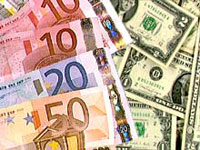Euro lower against U.S. dollar

The euro has lost ground against U.S. dollar on Tuesday, giving up gains the day before that pushed it close to its all-time record.
The 13-nation euro bought US$1.4167 in morning European trading, down from US$1.4200 in New York the previous night and the US$1.4243 it reached earlier in Monday.
The British pound fell to US$2.0350 from US$2.0424, while the dollar dropped to 116.79 Japanese yen from 117.21 yen.
The dollar has been under pressure from concerns over the health of the U.S. economy, which have fueled speculation that the Federal Reserve will soon cut interest rates again. The European Central Bank, however, has kept open the possibility of raising its rates, and the euro reached an all-time high of US$1.4282 on Oct. 1.
Still, comments overnight by ECB President Jean-Claude Trichet "underlined the fact that the ECB seems likely to leave rates unchanged at 4 percent next month too," said James Hughes, a market analyst at CMC Markets.
On Tuesday, Germany - the euro zone's biggest economy - reported that consumer price inflation reached 2.4 percent in September. That was down from an initial estimate of 2.5 percent, but still the highest level in two years.
Hughes noted that, in a speech Monday, Fed Chairman Ben Bernanke "emphasized that the US economy still wasn't in the clear and could yet face further fallout from the credit market squeeze."
In that speech, Bernanke once again pledged to "act as needed" to help financial markets - which have suffered through several months of turbulence - function smoothly and to keep the economy and inflation on an even keel.
Lower interest rates, used to jump-start the economy, can weaken a currency as investors transfer funds to countries where their deposits and fixed-income investments bring higher returns.
Subscribe to Pravda.Ru Telegram channel, Facebook, RSS!


